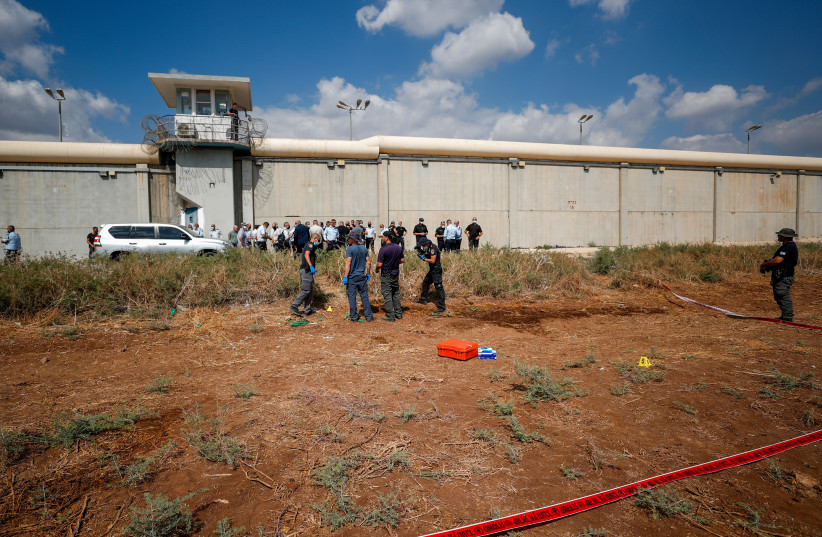The prison break by six terrorists out of the high-security Gilboa Prison in northern Israel is not only an embarrassment but poses a risk for an escalation of violence as security forces comb the country in an attempt to catch them.
The way that the six prisoners escaped Gilboa was a scene out of The Shawshank Redemption, except this time it wasn’t Andy Dufresne, but six men who have Israeli blood on their hands.
They dug a hole under the bathroom of their cell and escaped through a tunnel whose exit shaft was right under a guard tower.
According to reports, the guards are believed to have fallen asleep. It was that last piece of luck that allowed the men to run through a field to their getaway car and far from the prison before officers discovered that they were missing from their cells.
In the almost 72 hours since their Hollywood-style escape, the six fugitives have become heroes on the Palestinian street. Sweets were handed out across the territories and the Gaza Strip when news broke of their escape, with memes also shared across social media showing how the escape proved the failure of the occupation.

But how they will hopefully be caught – and what will happen in the meanwhile – is a massive security risk, especially during the high holidays.
The prisoners – including Zakaria Zubeidi, a leader of Fatah’s Al-Aqsa Martyrs Brigades, who played a key role in the Second Intifada – are all considered extremely dangerous. Israeli security officials think that they could carry out an attack while on the loose, or that other Palestinians emboldened by their release could carry out attacks in an attempt to distract troops from the manhunt. And should the escapees be killed by security forces, a new wave of terror attacks may break out.
The West Bank has seen a rise in violence over the past few months and IDF troops have been reinforced and deployed throughout the area to catch the fugitives, but also to respond quickly should an attack take place.
The fugitives have together been responsible for the deaths of dozens of Israelis, and Israeli security forces want to prevent any more bloodshed, especially during the Jewish Holidays over the coming month.
Should they decide not to carry out an attack and instead flee, there are three main locations where the escapees could run: across the border to Jordan, to Gaza, or to Jenin, around where they are all from.
Jenin is not only Zubeidi’s hometown, but is one of the more violent refugee camps in the West Bank, and one with high support for Palestinian Islamic Jihad. The escapees might find a number of residents ready and willing to help them hide there.
In recent months, Jenin has become a focal point of Palestinian resistance against security forces, with gunfights breaking out when troops enter to carry out arrest raids.
Since Operation Guardian of the Walls and the cancellation of the Palestinian Authority elections, both Hamas and Fatah have been fighting for dominance in the West Bank. With armed struggle bringing out more support following the May fighting, armed cells are feeling more confident to engage Israeli security forces.
The PA has also been weakened in the West Bank, especially in Jenin where they have little control. The lack of authority has led to an increase in weapons, which in turn has emboldened groups like Tanzim and Palestinian Islamic Jihad to engage with Israeli security forces.
It is highly probable that should the escapees be in Jenin a large firefight might ensue, which could even further deteriorate the situation should one of them or IDF troops be killed.
But they probably understand that their days would be numbered should they stay in the West Bank, so they might instead try to escape to Jordan. The border between Israel and Jordan is relatively easy to cross and from there, they can remain without concern of being returned to Israel.
Ahlam Tamimi, who is wanted by the United States for her role in orchestrating the deadly 2001 Sbarro pizzeria bombing in Jerusalem that killed 15 people, has been living in the Hashemite Kingdom after being freed from an Israeli jail as part of a prisoner swap for Gilad Shalit.
The escapees could also try to flee to Gaza, although the coastal enclave is one of the less likely options due to the blockade and security measures that make entry into the Strip quite difficult. But they would be in the clear and would only need to worry about being targeted by Israel from the sky.
All of Israel’s security services are taking part in the large-scale manhunt and over 200 checkpoints have been set up across the country. Dogs and aircraft are also being used and the Shin Bet (Israel Security Service) is using its technological and human intelligence capabilities to gather intelligence.
Security forces are working around the clock to get the fugitives back behind bars. It might take a few days, if not a few weeks or months. But security officials are adamant that they will be found: dead or alive.
